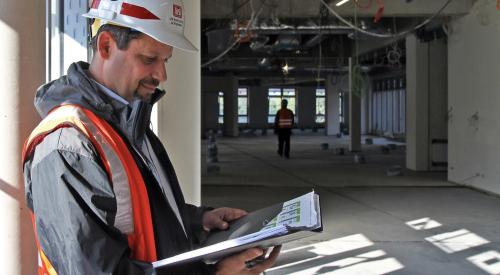You've set up a new trade council, but will it survive? Hal Peller has set up dozens with True North consulting and says a start-up council has a 60 percent fail rate in the first year. Here's advice to keep yours going.
Keep the non-builder facilitator
Consultants and builders recommend that the builder not run the meeting, and it should stay that way. This helps trades speak more openly.
Identify problems
Get buy-in and keep everyone focused by encouraging members to talk about problems -- and assign teams to solve them, says Peller. If they need extra motivation, says Jeff Meyer, who has organized multiple trade councils with large national production builders, underscore the major benefit: to save everyone money.
Recognize and reward
Congratulate trade partners for jobs well done. "You can recognize three trades that did an exceptional job," says Construction Manager Richard Ratliff of Drees Homes' Maryland Division. "Everyone likes to be rewarded."
Create a feedback culture
Drill it into trade partners' heads that their opinion is important and what keeps the trade council going. One way to accomplish that is by creating roles such as ombudsman, goal champion, information lead, etc., says Peller. Adds Ratliff: Committ from the top down to be open-minded."
Keep a tight agenda
Trade partner time is just as valuable. To keep everyone on track, have the trade council secretary or leader distribute an agenda ahead of time, and get feedback on it to make sure it's what the group wants to talk about.
Invite non-council members to meetings
Those who attend will go back to their crews and spread the news about what they learned.
Serve food
Last but certainly not least: ya' gotta have food. Ratliff recalls one trade council whose partners rotated picking up the lunch tab. "It became a competition," he says; every month the trade company to proivde food tried to outdo the last. A little food -- and camaraderie -- goes a long way.
RELATED ARTICLE:
6 Tips for a Successful Home Building Trade Council
By Jim Schug, Consultant, FMI Corp.
As builders face great challenges during this recession, every action is under great scrutiny. Smart builders are seeking out methods to decrease material cost and reduce overhead while improving production rates in order to reduce home costs. Some of these builders are investing time to build trade councils. Unfortunately, it takes work to keep them going and experience to start them properly or they may fail in the first year. Here are some tips to ensure your trade council survives.
Select members carefully
A critical step in the formation of the council is to select the “right” subcontractor leaders. Many subs are interested to be in the council to get early warning for new projects or get face time with builder leaders. While these are positive benefits, the subcontractor leaders must be mature enough to understand the big picture and integrated bottom line of the building process. Meeting management, conflict management and field presence are all critical traits of potential council members. Council members must be natural leaders and have respect of the other subcontractors.
Maintain focus
This is often accomplished by allowing the council to focus suggestions on how the builder can perform differently so subcontractors can be successful. Veterans of the industry know subcontractors make great builders. The council should also focus efforts on integration and Synchronization of trade partners. In many cases, more than 30 companies touch the physical home, many in non-sequential tasks. Proper coordination and two-way communication will reduce wasted effort and costs (subcontractor price for the home builder).
Effective start-up Councils will begin with examination of all of the issues faced by subcontractors and the builder. These items should be addressed at each meeting with an action plan and status. Also, the group should be aware of critical statistics and metrics – safety, warranty, build time, dry runs, to name a few. Effective groups will drive performance and have a positive impact on these metrics (which used to only be owned by the builder!) The council and builder team realize from the start that improvement of those metrics over time is key to the success and bottom line for all. (There is plenty of good to go around when we win.)
Remember: it’s a two-way street
Often, a builder’s approach to building a council with “trade partners” (sometimes a misnomer) is defensive, often resulting in failure. An effective council relies on building a partnering relationship. Builders often create the council so that they can use the subcontractor leaders to help enforce policies with other subcontractors. Goals and objectives must be agreed to by all from the beginning to clarify the role of the subcontractors, the role of the council and the role of the builder.
In every case, the builder and trades need to work to improve the end product: homes and communities. Some suggestions for improvement from the council must be acted upon early by the builder build trust. If the trade council is properly developed, it will actually take on the form of a team that includes the builder. In one council, the subcontractors took ownership of superintendent development and would openly discuss their progress with the Council.
Establish governance
The best councils are led by subcontractor leaders. The builder’s purchasing leader helps facilitate them properly but gives the council the autonomy to lead itself. One division president set it straight: “This is their council, and we want to keep it that way. They have ownership and decision rights to make this a great division.” Builder operations leaders and the division leadership should also be involved to show the council its importance.
At this critical time during home building, it is hard to believe that more divisions and builders do not have councils. The benefits of a trade council are well worth the time and can serve as an effective force multiplier.
Jim Schug is a consultant with FMI Corp. and has 14 years in the building industry.
Home Builder Perspective: Mike Palmer, Vice President, Piper Homes
"As a new start up home building company I thought it was an absolute necessity to set up a trade council. Although I had previous relationships with the majority of my contractors, they had very valid concerns over pay cycles, strength of the company, and construction pace. Setting up a council where we could have meaningful discussions allayed those concerns. The council was also instrumental in scheduling. We created all new product and the subs needed to learn to work together. They quickly realize the benefit when their crews show up and can get the work done timely and without call backs or lost work days. Communication is the key in any market but particularly in the market we have been experiencing. I benefit by knowing I have the best contractors building my homes whose interests are in line with mine in creating and establishing ourselves as a premier quality home builder."
In His Own Words: Jeff McGovern, Director of Construction, Lennar Colorado
- The leader/president,/chair person you pick to run the meetings is the key. It does not have to be from the builder side. I recommend selecting the person with the most leadership qualities: credibility, vision, ability to run meetings and keep things on track.
- You must have buy-in at the highest level of the organization. In addition, having an operating member (director level) as the liaison is important.
- Be mindful of who you select from the trade partner side to participate. In the beginning, it is important to hand select trade partners who have an overall vision of the industry, not just their particular trade. Avoid trade partners who want to use the council to air complaints.
- Keep the focus of the council narrow, but general. In other words, start off with a topic/topics that touches everyone (customer satisfaction), but don't try to solve all the issues in the first year. I recommend picking some quick hit issues that can be resolved quickly. If the members see that they are making a difference, they will be engaged.
- Select issues that are as much of an interest to the trades as they are to the builder. Do not use the council as a way to get the trades in line.
- Include a section on the monthly agenda to share information (this is also where buy-in from the top has to come). If you can share information like number of starts per month with the trades they are likely to keep coming just to get the information.
- Include the Trade Partner Council members (from both sides) in your company meetings. It shows that the builder thinks it's important and gives the sense to the trades that they are part of a bigger group.
- Hold meetings at their places of business. I have yet to meet a trade partner that doesn't want to host and show off what they've built.
- Including a piece on the agenda discussing trade partner appreciation engages them.
- Have a system to check-in periodically with the council. If they feel like they are working in a vacuum, they will get discouraged.
|












